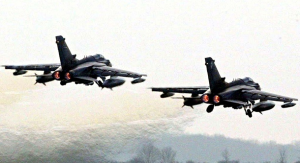According to analysis from the British newspaper The Guardian, British aircraft and unmanned drones have been attacking ISIS targets in Iraq with over 200 bombs and missiles in largely-ignored military operations. The air strikes, which started back in autumn, have been undertaken by the RAF’s oldest bombers, Tornado GR4s, as well as its newest weapon, the remotely-piloted Reaper. Tornados have dropped at least 87 Paveway IV bombs, and fired at least 47 Brimstone missiles, while Reapers have  fired more than 80 Hellfire missiles. Reapers, which are controlled via satellite in RAF Waddington in Lincolnshire, have fired more than 80 Hellfire missiles.
fired more than 80 Hellfire missiles. Reapers, which are controlled via satellite in RAF Waddington in Lincolnshire, have fired more than 80 Hellfire missiles.
ISIS targets attacked by the RAF include 20 buildings, 65 trucks and at least two containers. In at least 90 separate attacks, groups of what the Ministry of Defense (MoD) has called “terrorists” have been targeted. Nonetheless, British operations remain a fraction of those carried out by the US. American aircraft have attacked more than 6,000 ISIS targets as part of “Operation Inherent Resolve”, including around 2,000 buildings, 3,000 US Humvees and 80 tanks over Iraq and Syria. A House of Commons motion passed back in September excluded UK air strikes in Syria, and any decision to extend operations would require a separate vote in parliament. The cost of British weapons used against ISIS so far amounts to over 13 million pounds sterling, a figure that doesn’t include the cost of fuelling and maintaining the aircraft, including RAF Sentry command and control planes, Sentinel surveillance aircraft and Hercules transport planes.
The MoD describes Paveway IV bombs and Brimstone missiles, used to target ISIS, as “precision weapons”. In one attack back in March, a Tornado was said to have struck an armored personnel carrier positioned under a bridge. And earlier, a Reaper is said to have spotted an ISIS checkpoint, which they then attacked with a Hellfire missile. The Cyprus-based Tornados rely on Voyager air-to-air refueling tanker aircraft to sustain long-distance air patrols. In addition, a British military team has been deployed to northern Iraq, where they’re responsible for teaching infantry and first-aid skills to Kurdish Peshmerga volunteers, as well as how to combat improvised explosive devices (IED), which ISIS fighters have been using with increasing frequency as Iraqi forces drive them back.